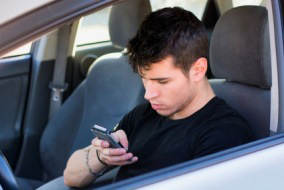
5 Seconds of Distraction
“I love you.” That’s the last text message an Indiana man sent his wife before losing control of a car that crashed into an Amish buggy killing three people. “Where u at” were the last words texted by an Arkansas girl killed on the day before her graduation.
More than 3,000 people a year die in distracted-driving crashes and about another 400,000 are injured. Researchers say that text messaging creates a crash risk 23 times worse than driving while not distracted, and that texting is involved in 18% of all distraction-related fatalities. The risk is particularly high for young people: Drivers in their 20s make up 27% of the distracted driving fatalities.
Even professional drivers are at risk, often with tragic results. Texting was cited as the cause of a 2008 California train crash that killed 25; a cell-phone using driver was involved in a 2013 train crash in Spain that killed 79 people.
When it comes to texting and phone use, most people underestimate the danger they pose and overestimate their own ability to multitask at the wheel. Distraction is a matter of seconds – if you are traveling at 55 mph, a mere five seconds will carry you the length of a football field.
Currently, 45 states and D.C. ban text messaging for all drivers; 14 states and D.C. prohibit all drivers from using hand-held cell phones while driving; 38 states and D.C. ban all cell phone use by novice drivers, and 20 states and D.C. prohibit it for school bus drivers.

While texting and phone use are among the top hazards, other distractions include: taking selfies, eating, grooming, reading maps, loose pets, reaching in the glove compartment, talking to passengers and turning to kids in the backseat.
The National Highway Traffic Safety Administration says driving distraction falls in three main categories:
- Manual – taking your hands off the wheel
- Visual – taking your eyes off the road
- Cognitive – taking your mind off driving
Experts suggest:
- Keeping a full focus on driving.
- Limiting phone use to emergencies – even hands-free phones can be a distraction.
- Pulling over to eat, use phones, read texts or consult maps.
- Preparing in advance so that distractions are limited. Plan routes, secure passengers and pets, have toll payments ready.
- Making it a strict habit not to text or call friends or family who are driving.
1.800.252.4555 or 1.800.225.2527
View more newsletters at www.theEAP.com
